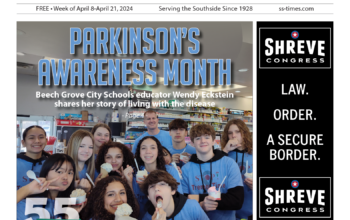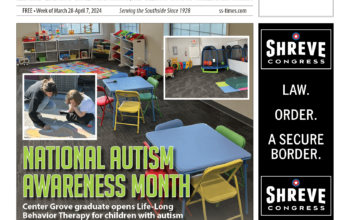By Stephanie Dolan
Stephanie Wilson was frustrated by the inability of her son Joey to accomplish many small tasks, but it turns out there was a good reason for Joey’s shortcomings. He was autistic.
“When he was about a year old, I noticed that he just wasn’t hitting his milestones the way other kids were,” Wilson said. “Anything that requires motor skills was a problem. He walked probably when he was a year-and-a-half, but he would hop on his knees instead of crawling. He had little to no eye contact. He was unable to play little games like patty cake.”
Then, when Joey was 4, the Wilsons found Cornerstone Autism Center in Greenwood.
“Cornerstone’s mission is the epitome of what I love most about my job,” Cornerstone’s speech-language pathologist Emily Diekhoff said. “Cornerstone’s mission is to maximize those who struggle, embrace those who love and fulfill those who serve. I love maximizing a child’s potential, supporting them to be able to successfully communicate, seeing progress and learning from each child every day.

“I love working with and supporting all of the children’s families, friends and support systems. Cornerstone is an ABA (applied behavior analysis) center that fosters collaboration, and I absolutely love being able to work together with the BCBAs, ABA therapists and the child’s whole team to best serve these children’s needs.”
Who they are
“They do everything,” Wilson said. “Cornerstone is Joey’s extended family. They’re very one-on-one with him, and they’ve really focused in on Joey’s particular needs. Their main focus with Joey is his ability to communicate. With Joey he would think he was doing a sign correct and it wasn’t. He sees differently than someone who’s not on the spectrum. Trying to crack that communication barrier was very difficult with him at first.”
“Autism is referred to as falling on a spectrum because there are several different symptoms that an individual may/may not exhibit, and they be more or less severe based on the person,” Dr. Kristen Hurley said. “Some of the earliest warning signs that a child might show would include making very little eye contact with people they know, not responding to their name and not communicating often with others, either by speaking or gesturing. There are other symptoms too, including having difficulty adjusting to change, repetitive body movements, sensory sensitivities and very ritualistic behaviors.”

Hurley said the social symptoms are the most weighted.
“It’s important to note that just because a child has a few of these behaviors, it does not necessarily mean that they have autism,” she said. “An evaluation with a psychologist or interdisciplinary team is the best way to address any concerns. Children may show symptoms beginning around 1 1/2 or 2 years old, but some children are diagnosed later.”
After Joey’s diagnosis, he began working with an AAC device, and has now been successfully utilizing this new communication tool for a little over a year.
What they do
“AAC is short for augmentative and alternative communication,” Diekhoff, 27, said. “Augmentative means ‘to supplement,’ so individuals can use AAC to help make communication easier. We all use augmentative communication to support our verbal speech like pointing, using gestures and facial expressions. Alternative or ‘instead of’ means that it completely replaces verbal communication such as using sign language, communication picture books and dedicated communication devices, which is known as an AAC device or a speech-generating device. The Centers for Medicare and Medicaid Services define speech-generating devices as ‘durable medical equipment that provides an individual who has a severe speech impairment with the ability to meet his or her functional speaking needs’.”
“There are a million less meltdowns,” Wilson said. “Joey’s much more confident. If he starts to get frustrated he goes for his tablet and lets me know why. He needs to be able to communicate his wants and needs. That’s true for everyone. It’s a whole different world. Everything from wants – when he’s hungry, when he’s thirsty and even types of foods. He’s a lot happier. He’s able to be the cheerful little kid that he’s capable of being.”

using his AAC devices.
Wilson also said that Joey’s speech and ability to use words has increased dramatically since beginning use of the device.
“The implementation of using AAC devices have made such a huge impact on many children at Cornerstone Autism Center whose verbal communication skills were restricted,” Diekhoff said. “Before the use of an AAC system, Joey’s expressive communication was significantly limited, which caused a lot of frustration and negative behaviors. With the AAC system, Joey now has a voice to be able to express himself. He is remarkable, and I am constantly amazed at how quickly he picks up on how to navigate and use his speech-generating device. It is incredible to see Joey use his device to be able to successfully communicate his thoughts, wants and needs.”
Who they help
“Individuals with autism have their own strengths and weaknesses, like anyone else,” Hurley said. “As they grow up, individuals with autism will all look very different from each other. Some people may eventually have very minimal noticeable symptoms, while others will continue to struggle more. The symptoms of autism definitely do not encompass who they are, and they will continually learn and grow. They may do some things differently than others, but ‘different’ doesn’t mean it is a problem. Our goal is always to help the individual live their life in a way that is as independent as possible and is meaningful to them.”
And Joey’s life is now more meaningful in many ways.
“I adore them,” Wilson said. “I think anybody who has a child who cannot attend school is in very, very good hands with Cornerstone. They really do become your second family. There’s nothing I feel uncomfortable talking about regarding my son. They’re all amazing people, and they truly care about these kids.”

“Being a speech-language pathologist is my dream job, and I am grateful that I am able to support my clients and help them find their voices to be able to express themselves,” Diekhoff said. “I am most appreciative that these children teach me something new and help me every day as well, and I am always constantly learning and growing professionally and personally.”
For more information on Cornerstone, visit its website at cornerstoneautismcenter.com.
5 Questions with Emily Diekhoff
Who or what inspires you?
My husband, my family and the children I work with every day inspire me.
If you woke up with a different job tomorrow, what would it be?
I love working with children, so I probably would be working as a teacher. I also love decorating and planning, so I would enjoy being an interior designer or event planner as well.
What’s your favorite song?
“Forever Like That,” by Ben Rector.
What are you currently reading?
I’m currently reading Thirty Million Words by Dana Suskind for a second time.
Do you have any pets?
My husband and I have one dog, named Winnie. She is a 1-year-old Great Pyrenees who brings a lot of fun, joy and spunkiness into our lives.


